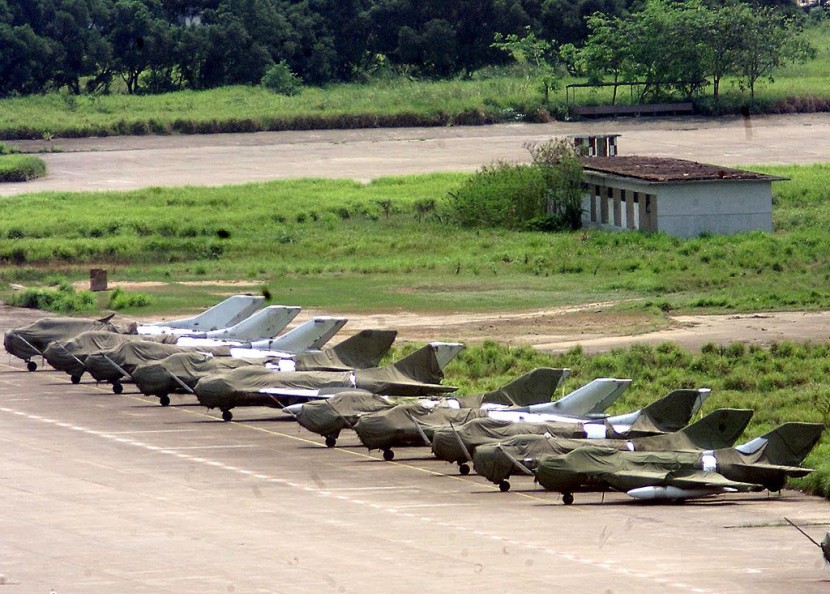
After the US rejected Chinese claims over the Taiwan Strait and allegations of military sales negotiations with Taipei in Washington, China launched its third largest sortie of aircraft against Taiwan this year.
According to a tweet from Taiwan's Ministry of National Defense, 29 Chinese aircraft, including six H-6 bombers and an electronic intelligence collection plane, entered the country's southwestern air defense identification zone on Tuesday.
China Conducts Military Activities in Taiwan Territory
Taiwanese Foreign Minister Joseph Wu said on Twitter that the latest incursion demonstrated China's military threat was "more serious than ever." The deployment of warplanes was the largest since May 30, when 30 People's Liberation Army planes buzzed the island during a three-day visit by US Senator Tammy Duckworth.
Before that, China performed 39 flights on January 23, the most this year, a day after the United States and Japan launched a combined naval drill in the Philippine Sea. The recent flights come after reports that the Biden administration has opted to reject China's ambiguous new declaration that the Taiwan Strait is not international waters, raising worries that the attitude may lead to more regular problems at sea for the democratically ruled island.
At a news conference on Tuesday, State Department spokesman Ned Price reiterated that the US considers the Taiwan Strait to be an international waterway. Separately, Taiwan and US officials will meet in Washington this week to discuss arms sales in sessions that have typically been classified as monetary negotiations, according to the Taipei-based United Daily News, citing anonymous sources.
Wellington Koo, secretary-general of Taiwan's National Security Council, was scheduled to meet with US defense officials, according to the outlet. China has increased military, diplomatic, and economic pressure on Taiwan's ruling Democratic Progressive Party, which believes the island is a de facto independent entity seeking greater international recognition and not part of Chinese territory, according to Bloomberg.
US Changes Strategic Policy on Taiwan
China launched it's first domestically designed and built aircraft carrier last Friday, a crucial step toward modernizing its military and competing with the US at sea. The Fujian, named after the southeastern coastal province opposite Taiwan, is Beijing's third and most modern aircraft carrier to date, with a full-length flight deck and an electromagnetic catapult-assisted launch system.
According to a US State Department official, Beijing should stop its military, diplomatic, and economic coercion and intimidation against Taiwan. Last month, China's PLA staged an exercise surrounding Taiwan as a solemn warning against collusion with the US.
That action occurred after US President Joe Biden suggested a shift in the country's policy of strategic ambiguity on Taiwan by stating that if China attacked Taiwan the US would intervene militarily.
The leaders clashed over Taiwan at the first virtual encounter between US President Joe Biden and China's Xi Jinping. Biden informed his colleague that the United States was vehemently opposed to unilateral moves to "alter the status quo" or damage peace and stability across the Taiwan Strait, Independent reported.
Reiterating Beijing's stance, an editorial in China's state-run newspaper Global Times on Wednesday stated that the whole Taiwan Strait - the 110-mile-wide (180-kilometer) body of water between Taiwan and mainland China - is not international waters, but rather entirely within Beijing's control.
According to the Global Times, the activities of the US and other vessels that frequently travel through the strait constitute provocations that undermine Chinese sovereignty and are not innocent passage, a recognized international right.
The US Navy, on the other hand, sends warships through the strait regularly, notably on May 10, when the guided-missile cruiser USS Port Royal performed a transit. International law, like airspace, states that a country's territorial waters extend 12 nautical miles from its shore, as per CNN.
Related Article : China Ramps Up Rhetoric Against US Over Taiwan Issue as Leaked Recordings Reveal Beijing's Invasion Plan, Prepares Troops for War
@YouTube








